Martin Edwards's Blog, page 247
April 3, 2012
Editing Anthologies
I received an email a little while ago from John Sargent, giving me some interesting information about CWA anthologies of the past, and also suggesting that I write a post for this blog about the process of editing an anthology. A nice idea, and I'm glad to respond.
Anthologies come in various different forms, and the approach that one takes depends on what the publisher is trying to achieve, and also, needless to say, the budget. And suffice to say that budgets are often very tight indeed.
I've been involved with editing four different types of anthology. First, three collections of crime writing by members of the Northern Chapter of the CWA, and one by members of the East Anglian Chapter, which I co-edited with Robert Church. Second, thirteen collections of crime fiction by CWA members not only from the UK but also elsewhere in the world. Third, two collections b members of Murder Squad. And fourth, a "Lost Classics" collection of stories by Ellis Peters, with input from the late Sue Feder, and published by Crippen and Landru.
The approach I've taken has varied depending on the type of book, but with the annual CWA volume, I seek contributions from members and wait to see what comes in. I usually aim to have original stories specially written for the book, but occasionally I'll include a previously published story by a stellar name such as Ruth Rendell.
Publishers like big name contributors, because they help to sell books. But of course it's very hard to persuade a bestselling writer to write a brand new story for a tiny sum of money when they have little time to spare and anyway, could do far better elsewhere. However, I must say that time and again, major writers have shown a good deal of generosity in their response to requests I've made for help. I've been very grateful to them - not just Ruth Rendell, by the way, but Colin Dexter, the late Reg Hill, and numerous others.
The tricky bit comes in deciding which stories to include and which to reject. I hate turning down stories, especially if they are written by friends. But it's impossible to include everything that is submitted, even when it's of very good quality. I can only hope that people whose stories are not accepted understand the dilemma. In picking stories, I'm looking not just for merit, but for balance and variety. So if I receive three or four stories about spouse-murder or blackmail, for instance, some of them will have to go.
I do have a preference for shorter stories, and those that are unusual. I also pay a lot of attention to submissions from writers who haven't previously featured in the CWA anthology and from those who are less well-known. The book is a showcase for members, and it should, I think, be a showcase for all types of writers, not just the stars. But above all, of course, one is trying to put together a book that is fresh and entertaining, and that readers will enjoy.
Anthologies come in various different forms, and the approach that one takes depends on what the publisher is trying to achieve, and also, needless to say, the budget. And suffice to say that budgets are often very tight indeed.
I've been involved with editing four different types of anthology. First, three collections of crime writing by members of the Northern Chapter of the CWA, and one by members of the East Anglian Chapter, which I co-edited with Robert Church. Second, thirteen collections of crime fiction by CWA members not only from the UK but also elsewhere in the world. Third, two collections b members of Murder Squad. And fourth, a "Lost Classics" collection of stories by Ellis Peters, with input from the late Sue Feder, and published by Crippen and Landru.
The approach I've taken has varied depending on the type of book, but with the annual CWA volume, I seek contributions from members and wait to see what comes in. I usually aim to have original stories specially written for the book, but occasionally I'll include a previously published story by a stellar name such as Ruth Rendell.
Publishers like big name contributors, because they help to sell books. But of course it's very hard to persuade a bestselling writer to write a brand new story for a tiny sum of money when they have little time to spare and anyway, could do far better elsewhere. However, I must say that time and again, major writers have shown a good deal of generosity in their response to requests I've made for help. I've been very grateful to them - not just Ruth Rendell, by the way, but Colin Dexter, the late Reg Hill, and numerous others.
The tricky bit comes in deciding which stories to include and which to reject. I hate turning down stories, especially if they are written by friends. But it's impossible to include everything that is submitted, even when it's of very good quality. I can only hope that people whose stories are not accepted understand the dilemma. In picking stories, I'm looking not just for merit, but for balance and variety. So if I receive three or four stories about spouse-murder or blackmail, for instance, some of them will have to go.
I do have a preference for shorter stories, and those that are unusual. I also pay a lot of attention to submissions from writers who haven't previously featured in the CWA anthology and from those who are less well-known. The book is a showcase for members, and it should, I think, be a showcase for all types of writers, not just the stars. But above all, of course, one is trying to put together a book that is fresh and entertaining, and that readers will enjoy.
Published on April 03, 2012 16:35
April 1, 2012
The Prague Spring


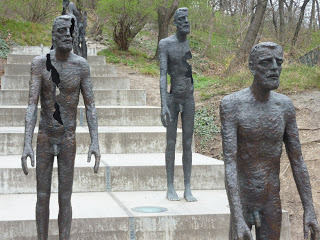


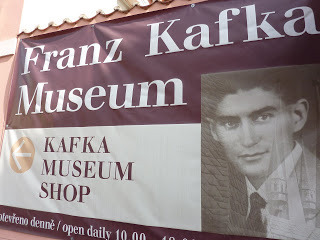
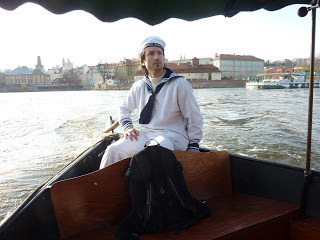

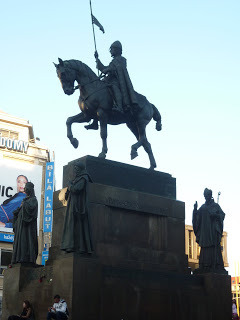
Last week, I managed to achieve a long-held ambition by visiting Prague, and I certainly wasn't disappointed by my all too short trip to the crossroads of Europe. The unexpectedly superb weather was a bonus, but the city is so fabulous that it would be a great destination in any weather.
I studied Franz Kafka when I was doing my A Levels long ago, and I have always enjoyed his work, so a visit to the Kafka Museum was a must. Very good it was, too. And I was amused to find not only a Sherlock Holmes pub, but also a tobacconists' known as Baker Street.
I was struck by the monument to those who suffered when the country was under Commmunist rule. Suffice to say that capitalism has really taken hold of the place now, but it's important to remember the past, especially when, in difficult economic times, many questions are bound to be asked about the way society is run. Questions which, as Kafka intimated a century ago, are not easy to answer.
Above all, I found a visit to the Jewish Quarter unforgettable. The whole area is fascinating, but one thing I'll not easily forget is the synagogue in which are displayed pictures drawn by young children who were held by the Nazis, and almost all of whom were killed in the death camps a year or two later. The hopefulness and humanity of their art work was unbearably poignant. And again, we need these reminders of the past, in order that the mistakes of history are not repeated.
Published on April 01, 2012 16:57
March 29, 2012
Forgotten Book: Crime on the Coast and No Flowers by Request
Crime on the Coast and No Flowers By Request are two round-robin novellas that have been published in hardback and paperback in a single volume which is my Forgotten Book for today. They are often assumed to be Detection Club productions, but in fact Crime on the Coast was put together by a group which included non-Club members.
No Flowers by Request first appeared in 1953 as a serial in The Daily Sketch. It's a domestic poisoning mystery, with two chapters written by each of the five contributors. The story is kicked off by Dorothy L. Sayers, and I suspect this may have been her last published foray into detective fiction – though I stand to be corrected. She introduces the story in characteristically assured fashion, with a first person narration by a widow who decides to become a cook-housekeeper. When reading her contribution, I thought what a pity it was that, effectively, she gave up writing mysteries before the start of the Second World War. Her talent was undimmed more than a decade later, even in this fragment.
Later chapters are supplied by E.C. R. Lorac, Gladys Mitchell, Anthony Gilbert and Christianna Brand. An all-female line-up of writers (Gilbert's real name was Lucy Malleson) and perhaps that is why a domestic setting was chosen. It is certainly well portrayed, and the mystery isn't bad.
Crime on the Coast was serialised a year later in The News Chronicle. This time the story begins, in typically atmospheric fashion, with John Dickson Carr describing a strange encounter at a slightly macabre seaside fun fair. Later chapers are supplied by Valerie White, Laurence Meynell, Joan Fleming, Michael Cronin and Elizabeth Ferrars. I must admit I've never heard of White or Cronin, but their sections aren't at all bad. However, as is often the case with round-robin mysteries, the story-line becomes increasingly unlikely as events move on. This is partly because of the need to provide cliffhanger chapter endings for the serialisation in the newspaper.
All in all, these are minor pieces of work, but I enjoyed reading them. They rank as curiosities, but collaborative writing is extremely interesting, both in theory and in practice, and the stories are, therefore, worth a look, especially for fans of Carr and Sayers. No Gideon Fell or Peter Wimsey, though!
No Flowers by Request first appeared in 1953 as a serial in The Daily Sketch. It's a domestic poisoning mystery, with two chapters written by each of the five contributors. The story is kicked off by Dorothy L. Sayers, and I suspect this may have been her last published foray into detective fiction – though I stand to be corrected. She introduces the story in characteristically assured fashion, with a first person narration by a widow who decides to become a cook-housekeeper. When reading her contribution, I thought what a pity it was that, effectively, she gave up writing mysteries before the start of the Second World War. Her talent was undimmed more than a decade later, even in this fragment.
Later chapters are supplied by E.C. R. Lorac, Gladys Mitchell, Anthony Gilbert and Christianna Brand. An all-female line-up of writers (Gilbert's real name was Lucy Malleson) and perhaps that is why a domestic setting was chosen. It is certainly well portrayed, and the mystery isn't bad.
Crime on the Coast was serialised a year later in The News Chronicle. This time the story begins, in typically atmospheric fashion, with John Dickson Carr describing a strange encounter at a slightly macabre seaside fun fair. Later chapers are supplied by Valerie White, Laurence Meynell, Joan Fleming, Michael Cronin and Elizabeth Ferrars. I must admit I've never heard of White or Cronin, but their sections aren't at all bad. However, as is often the case with round-robin mysteries, the story-line becomes increasingly unlikely as events move on. This is partly because of the need to provide cliffhanger chapter endings for the serialisation in the newspaper.
All in all, these are minor pieces of work, but I enjoyed reading them. They rank as curiosities, but collaborative writing is extremely interesting, both in theory and in practice, and the stories are, therefore, worth a look, especially for fans of Carr and Sayers. No Gideon Fell or Peter Wimsey, though!
Published on March 29, 2012 16:13
March 27, 2012
Narratives of Enclosure
A brand new study of the locked room mystery has just been published – the first of its kind. The title is Narratives of Enclosure in Detective Fiction, the author Michael Cook, and the publisher Palgrave Macmillan. It's an expensive book, like so many academic texts, but I decided to treat myself.
In fact, the book is not quite what I expected, for a number of reasons. The author's starting point is interesting. He suggests that Poe's "The Murders in the Rue Morgue" set a pattern for detective fiction with an emphasis on "enclosures, death and references to sequestered lives". So although there is quite a bit of focus on Golden Age fiction, when – most people would accept, I think – the locked room mystery was in its hey-day, the book includes extensive discussion of some stories that one wouldn't really associate with the locked room sub-genre. A key example is that splendid Charles Dickens story, "The Signalman".
Seven of the eight chapters focus predominantly on specific authors. The obvious candidates, G.K. Chesterton and John Dickson Carr, are among them. But so too are Dickens, Anna Katherine Green, Jorge Luis Borges and Paul Auster. This eclectic and surprising mix offers much food for thought.
A possible criticism of the book is that, at times, there seems to be almost as much discussion of academic studies of crime fiction as there is about individual locked room mysteries. Some excellent locked room mysteries are not even mentioned – for instance, Rim of the Pit, by Hake Talbot.
However, perhaps it is unfair to focus too much on omissions. All books of this kind have to be selective; there is no alternative. This is a thought-provoking book, and although I don't see it as truly definitive as a study of its subject, it's well worth a look if you are keen on studies of crime fiction.
In fact, the book is not quite what I expected, for a number of reasons. The author's starting point is interesting. He suggests that Poe's "The Murders in the Rue Morgue" set a pattern for detective fiction with an emphasis on "enclosures, death and references to sequestered lives". So although there is quite a bit of focus on Golden Age fiction, when – most people would accept, I think – the locked room mystery was in its hey-day, the book includes extensive discussion of some stories that one wouldn't really associate with the locked room sub-genre. A key example is that splendid Charles Dickens story, "The Signalman".
Seven of the eight chapters focus predominantly on specific authors. The obvious candidates, G.K. Chesterton and John Dickson Carr, are among them. But so too are Dickens, Anna Katherine Green, Jorge Luis Borges and Paul Auster. This eclectic and surprising mix offers much food for thought.
A possible criticism of the book is that, at times, there seems to be almost as much discussion of academic studies of crime fiction as there is about individual locked room mysteries. Some excellent locked room mysteries are not even mentioned – for instance, Rim of the Pit, by Hake Talbot.
However, perhaps it is unfair to focus too much on omissions. All books of this kind have to be selective; there is no alternative. This is a thought-provoking book, and although I don't see it as truly definitive as a study of its subject, it's well worth a look if you are keen on studies of crime fiction.
Published on March 27, 2012 16:38
March 25, 2012
Dead Image and Avon Street
The combination of history with mystery is a beguiling one. It's hard to believe now, but when Agaaha Christie wrote a whodunit set in Ancient Egypt, Death Comes as the End, it was an unusual - and rather brave - thing to do. Now, historical mysteries abound, and a number of authors have carved terrific reputations in the field.
I first came across The History Press when they agreed to publish last year's Murder Squad anthology, Best Eaten Cold. The book appeared under a new imprint, The Mystery Press, and this is a brand which seems to be going from strength to strength.
Two recent titles from this stable deserve particular mention. Dead Image, by Joan Lock, is a paperback edition of a book which first appeared more than a decade ago. Joan Lock is a former police officer (so was her late husband Bob, a chap with a delightful sense of humour whom I first met, with Joan, at CWA conferences more than 20 years ago.) She has a great deal of expertise in the field of police history, and this book, featuring Detective Sergeant Best, is a typically well-researched and entertaining novel. Joan is definitely an author to check out, and an acknowledged expert in her field.
Paul Emanuelli, in contrast, is a new name to me. His book Avon Street, is a tale of murder in Victorian Bath. As Peter Lovesey has shown, Bath is a fascinating setting for a mystery, and Emanuelli has produced an adventure story with its roots - as a short afterword explains - in reality. There's some good stuff here, but the book is twice as long as Dead Image, and I think Joan Lock's book shows that there is often a great deal of merit in concision, even if it means excluding some interesting research material.
I first came across The History Press when they agreed to publish last year's Murder Squad anthology, Best Eaten Cold. The book appeared under a new imprint, The Mystery Press, and this is a brand which seems to be going from strength to strength.
Two recent titles from this stable deserve particular mention. Dead Image, by Joan Lock, is a paperback edition of a book which first appeared more than a decade ago. Joan Lock is a former police officer (so was her late husband Bob, a chap with a delightful sense of humour whom I first met, with Joan, at CWA conferences more than 20 years ago.) She has a great deal of expertise in the field of police history, and this book, featuring Detective Sergeant Best, is a typically well-researched and entertaining novel. Joan is definitely an author to check out, and an acknowledged expert in her field.
Paul Emanuelli, in contrast, is a new name to me. His book Avon Street, is a tale of murder in Victorian Bath. As Peter Lovesey has shown, Bath is a fascinating setting for a mystery, and Emanuelli has produced an adventure story with its roots - as a short afterword explains - in reality. There's some good stuff here, but the book is twice as long as Dead Image, and I think Joan Lock's book shows that there is often a great deal of merit in concision, even if it means excluding some interesting research material.
Published on March 25, 2012 16:31
March 23, 2012
Forgotten Book - The Footsteps at the Lock
Ronald Knox, author of today's Forgotten Book, The Footsteps at the Lock, was to my mind a rather frustrating detective novelist. He had great gifts – an understanding of human nature, a sharp wit, and an intricate mind – that suited him ideally to Golden Age fiction. Yet overall, I fear, the verdict must be that he under-achieved.
This novel is an example of what I mean. It begins splendidly, and wittily, setting the scene for a story about complications over an inheritance. Two cousins who loathe each other decide, for dubious reasons, to go on a boat trip together – and one of them goes missing. Has he been killed by his cousin? The plot soon thickens agreeably.
Miles Bredon, an insurance investigator, is called in by his firm, and he is accompanied by his likeable wife Angela. Unfortunately, the story-line becomes bogged down in complications about what precisely did happen on the ill-fated boat trip, and the arrival on the scene of an improbable American called Erasmus Quirk doesn't improve things, although it does turn out to be highly relevant to the plot.
The real trouble is that one of the cousins turns out to be very different in practice from the way in which he is at first presented, and this uncertain handling of character seems to me to be at the heart of Knox's struggle with the genre. Intellectually, he was a master of it, but he could not inject into his books the same level of empathy with his people that, say, Henry Wade, Sayers or Christie achieved. For a priest, this seems rather surprising, and one does wonder whether his approach was over-intellectual. So The Footsteps at the Lock ranks as a fair example of the classic detective novel, but not the masterpiece I began to hope for when relishing the early pages.
This novel is an example of what I mean. It begins splendidly, and wittily, setting the scene for a story about complications over an inheritance. Two cousins who loathe each other decide, for dubious reasons, to go on a boat trip together – and one of them goes missing. Has he been killed by his cousin? The plot soon thickens agreeably.
Miles Bredon, an insurance investigator, is called in by his firm, and he is accompanied by his likeable wife Angela. Unfortunately, the story-line becomes bogged down in complications about what precisely did happen on the ill-fated boat trip, and the arrival on the scene of an improbable American called Erasmus Quirk doesn't improve things, although it does turn out to be highly relevant to the plot.
The real trouble is that one of the cousins turns out to be very different in practice from the way in which he is at first presented, and this uncertain handling of character seems to me to be at the heart of Knox's struggle with the genre. Intellectually, he was a master of it, but he could not inject into his books the same level of empathy with his people that, say, Henry Wade, Sayers or Christie achieved. For a priest, this seems rather surprising, and one does wonder whether his approach was over-intellectual. So The Footsteps at the Lock ranks as a fair example of the classic detective novel, but not the masterpiece I began to hope for when relishing the early pages.
Published on March 23, 2012 00:08
March 21, 2012
The Somnambulist: review
The Somnambulist by Essie Fox is one of the books featured in the TV Book Club 2012, sponsored by Specsavers. It's described on the cover as "a spellbinding tale of lost love, grief, murder and madness in Victorian England", and that's a pretty fair summary.
There is mention of that Wilkie Collins masterpiece, The Woman in White, in the opening pages – it's said that a painting by Millais of a young female somnambulist may have been inspired by it. This suggests that we are in for a densely plotted murder mystery of the kind Collins favoured, but although there is a murder which has a critical effect on the events of the story, I wouldn't say that this is first and foremost a crime novel. And perhaps this book is a good illustration of the unsatisfactory nature of genre definitions – however one describes it, the key point is that it is a pretty gripping read.(It's an odd coincidence, by the way, that another fictional, though very different, painting by Millais features in The Hanging Wood.)
The focal point is young Phoebe Turner, and most of the story is told from her perspective. Her devotion to her Aunt Cissy leads her to a brief involvement in the music hall, and after her aunt's death, because her mother is impoverished, Phoebe accepts a job as a companion to a sickly and reclusive woman who is married to businessman Nathaniel Samuels.
Several chapters are presented in the third person, with Samuels as the viewpoint character. A considerable amount of plot development is conducted in these chapters, which are rather less satisfactory than those narrated by Phoebe – a character who clearly fascinated her author. But this is a minor flaw in a truly accomplished debut novel.
I'm a fan of Victorian fiction, and also of more recent books set in the Victorian period. That age has an enduring appeal, and Essie Fox captures it very well. Her descriptive powers are formidable, and she conjures up splendidly both the bustle of the East End and the sinister atmosphere of the Samuels' country retreat. A very good read.
There is mention of that Wilkie Collins masterpiece, The Woman in White, in the opening pages – it's said that a painting by Millais of a young female somnambulist may have been inspired by it. This suggests that we are in for a densely plotted murder mystery of the kind Collins favoured, but although there is a murder which has a critical effect on the events of the story, I wouldn't say that this is first and foremost a crime novel. And perhaps this book is a good illustration of the unsatisfactory nature of genre definitions – however one describes it, the key point is that it is a pretty gripping read.(It's an odd coincidence, by the way, that another fictional, though very different, painting by Millais features in The Hanging Wood.)
The focal point is young Phoebe Turner, and most of the story is told from her perspective. Her devotion to her Aunt Cissy leads her to a brief involvement in the music hall, and after her aunt's death, because her mother is impoverished, Phoebe accepts a job as a companion to a sickly and reclusive woman who is married to businessman Nathaniel Samuels.
Several chapters are presented in the third person, with Samuels as the viewpoint character. A considerable amount of plot development is conducted in these chapters, which are rather less satisfactory than those narrated by Phoebe – a character who clearly fascinated her author. But this is a minor flaw in a truly accomplished debut novel.
I'm a fan of Victorian fiction, and also of more recent books set in the Victorian period. That age has an enduring appeal, and Essie Fox captures it very well. Her descriptive powers are formidable, and she conjures up splendidly both the bustle of the East End and the sinister atmosphere of the Samuels' country retreat. A very good read.
Published on March 21, 2012 09:23
March 19, 2012
Book collections
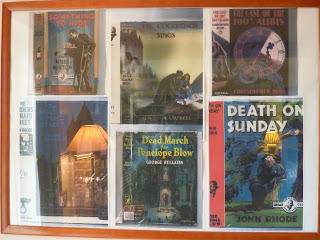
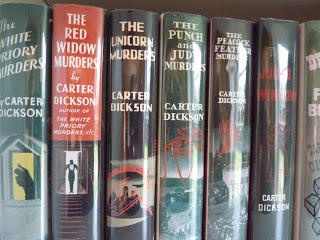
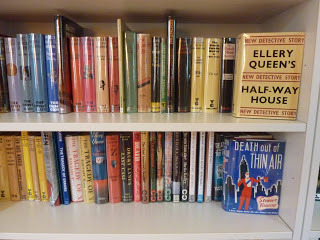
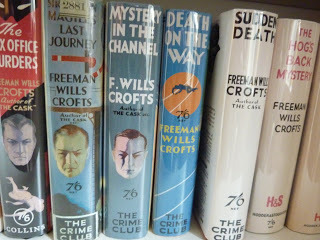

I am fascinated by other people's book collections. You can tell quite a bit (but far from everything!) about someone from the books they own, and once or twice I've used this as an element in my own stories. As recently as last week, I was writing a scene for my new book, set in the sadly fictional Amos Books in the Lake District, and drawing on what I have learned from various expert book dealers and collectors.
Last September, I had the great pleasure of visiting John Curran's home, and admiring his extensive and very well-organised book collection. As you would expect of a great expert on Agatha Christie, the Queen of Crime is prominent, but John also has some fine examples of the work of other Golden Age writers, as well as some enviable signed and inscribed classics.
Just before Christmas, I called on James M. Pickard, who – like those other excellent bookdealers, Mark Sutcliffe and Jamie Sturgeon, all of whom I can recommend – has a terrific stock of second hand crime novels. James is not just a dealer, but also a collector, and he has a marvellous array of books and artwork associated with Ian Fleming.
I was fascinated to see some of the obscure Golden Age titles in James' collection. One of the remarkable features of them was the excellence of their condition – very important to keen collectors, since in some cases, a fine dust jacket can increase the value of a book tenfold. Many investors are interested in rare books these days, not least because of the unreliability of the stock market. I don't myself look on books as investments, but I can understand why some people do. But whether as possible investments or just lovely things to have, James' stock is truly impressive. If you'd like to know more, take a look at
his website
Finally, after my Sayers lecture, I travelled to the Home Counties to stay with another friend who has a truly astonishing collection. And it is his books that feature in the photos. For any Golden Age fan, truly mouth-watering!
Published on March 19, 2012 00:59
Murder, magic and music
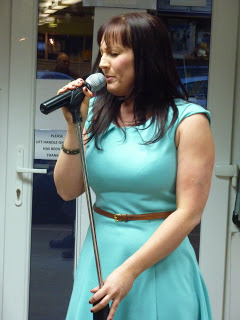
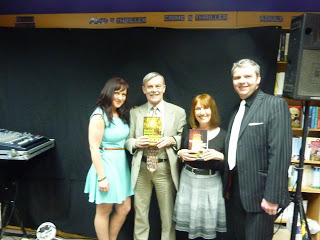
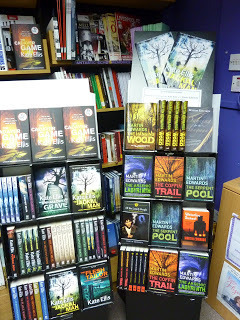
Most readers of this blog are, I think, fans of independent bookshops, and I had a great time last Thursday evening visiting Formby Books, a newish venture set up by Tony, a very good and experienced bookseller. It really was as varied and enjoyable a bookshop event as I've participated in.
Formby is a very pleasing place, located between Liverpool and Southport, but with a distinct identity. The shop shares premises with a florist's, and there is a cafe (a very good idea!). Tony had arranged wine and nibbles, but none of us expected a turnout of 60 on a chilly evening. A very gratifying response from the local community.
There was a magician, John Harding, who works sometimes for Manchester United (actually, Man City are in need of magic more at present, I'm sorry to say), and a glamorous singer, Vicky Abban, who amazingly turned out to be Tony's deputy manager (should Marc Amos recruit a singing assistant, I wonder?). John did up-close tricks which engaged the audience greatly, while Vicky chose numbers with a crime/thriller link (but I should have requested my favourite Bond theme, "We Have All the Time in the World" – I'm sure she'd have done that brilliant John Barry-Hal David song really well.)
Then I shared the platform with my old chum Kate Ellis, who was launching her new book, The Cadaver Game. The event coincided very happily with publication of All the Lonely People as an Arcturus Crime Classic, and I'm really excited to see readers buying Harry Devlin's first adventure 20 years after he first prowled the mean streets of Merseyside. In fact, the book sold out on the night, and various customers placed orders.
The audience included two more old friends, the delightful Liverpool romance writer June Francis, and the versatile sometime crime writer Ron Ellis. It was also good to meet a wide range of other mystery fans – including the moving spirit behind that very good blog In Search of the Classic Mystery Novel, Puzzle Doctor. All too soon the evening was over, but I hope its success will be the start of many good things for Tony and his team.
Published on March 19, 2012 00:28
March 16, 2012
Forgotten Book - The Third Lady
My Forgotten Book for today is one of the few Japanese novels that I've read (in translation, I hasten to add.) It is The Third Lady by Shizuko Natsuki, and I learned of it from John Norris's brilliant blog. John raved over it, and when I saw that Ed Gorman – someone whose literary judgment is irreproachable – had also admired the novel, I simply had to read it.
And I wasn't disappointed, though I must say I thought the translation by Robert Rohmer had one or two infelicities here and there. But it's a story of "murder by proxy" which takes the basic idea of Patricia Highsmith's classic Strangers on a Train, but puts a very different spin on it.
This idea of giving a fresh twist to an old idea is one that appeals to me. After all, most ideas have crossed someone else's mind in the past. And Natsuki does very well to turn his story into a sort of moral fable, while giving his tale an excellent twist.
The premise is that a man and woman have a fleeting encounter and tell each other about someone they hate and whom they wish dead. The man, Kohei Daigo, finds that his enemy is killed by a mystery woman. He's sure the killer is the woman by whom he is now quite obsessed. But can he bring himself to kill her enemy? It's cleverly done, and I enjoyed reading the book. First published in 1987, it certainly doesn't deserve to be forgotten.
And here's a question. What other "murder by proxy" stories are out there? I can think of at least two, and that isn't counting the embryonic story I dreamed up when visiting Dublin last year!
And I wasn't disappointed, though I must say I thought the translation by Robert Rohmer had one or two infelicities here and there. But it's a story of "murder by proxy" which takes the basic idea of Patricia Highsmith's classic Strangers on a Train, but puts a very different spin on it.
This idea of giving a fresh twist to an old idea is one that appeals to me. After all, most ideas have crossed someone else's mind in the past. And Natsuki does very well to turn his story into a sort of moral fable, while giving his tale an excellent twist.
The premise is that a man and woman have a fleeting encounter and tell each other about someone they hate and whom they wish dead. The man, Kohei Daigo, finds that his enemy is killed by a mystery woman. He's sure the killer is the woman by whom he is now quite obsessed. But can he bring himself to kill her enemy? It's cleverly done, and I enjoyed reading the book. First published in 1987, it certainly doesn't deserve to be forgotten.
And here's a question. What other "murder by proxy" stories are out there? I can think of at least two, and that isn't counting the embryonic story I dreamed up when visiting Dublin last year!
Published on March 16, 2012 00:10



